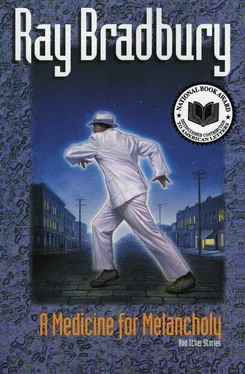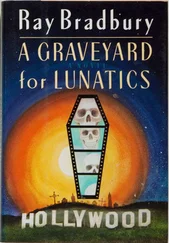Mr. Bittering held to the side of the canal, his body cold and his heart pounding slowly. “What is this new name?”
“Linnl. Isn’t that a good name? Can I use it? Can’t I, please?”
Mr. Bittering put his hand to his head. He thought of the silly rocket, himself working alone, himself alone even among his family, so alone.
He heard his wife say, “Why not?”
He heard himself say, “Yes, you can use it.”
“Yaaa!” screamed the boy. “I’m Linnl, Linnl!”
Racing down the meadowlands, he danced and shouted.
Mr. Bittering looked at his wife. “Why did we do that?”
“I don’t know,” she said. “It just seemed like a good idea.”
They walked into the hills. They strolled on old mosaic paths, beside still pumping fountains. The paths were covered with a thin film of cool water all summer long. You kept your bare feet cool all the day, splashing as in a creek, wading.
They came to a small deserted Martian villa with a good view of the valley. It was on top of a hill. Blue marble halls, large murals, a swimming pool. It was refreshing in this hot summertime. The Martians hadn’t believed in large cities.
“How nice,” said Mrs. Bittering, “if we could move up here to this villa for the summer.”
“Come on,” he said. “We’re going back to town. There’s work to be done on the rocket.”
But as he worked that night, the thought of the cool blue marble villa entered his mind. As the hours passed, the rocket seemed less important.
In the flow of days and weeks, the rocket receded and dwindled. The old fever was gone. It frightened him to think he had let it slip this way. But somehow the heat, the air, the working conditions—
He heard the men murmuring on the porch of his metal shop.
“Everyone’s going. You heard?”
“All going. That’s right.”
Bittering came out. “Going where?” He saw a couple of trucks, loaded with children and furniture, drive down the dusty street.
“Up to the villas,” said the man.
“Yeah, Harry. I’m going. So is Sam. Aren’t you Sam?”
“That’s right, Harry. What about you?”
“I’ve got work to do here.”
“Work! You can finish that rocket in the autumn, when it’s cooler.”
He took a breath. “I got the frame all set up.”
“In the autumn is better.” Their voices were lazy in the heat.
“Got to work,” he said.
“Autumn,” they reasoned. And they sounded so sensible, so right.
“Autumn would be best,” he thought. “Plenty of time, then.”
No! cried part of himself, deep down, put away, locked tight, suffocating. No! No!
“In the autumn,” he said.
“Come on, Harry,” they all said.
“Yes,” he said, feeling his flesh melt in the hot liquid air. “Yes, in the autumn. I’ll begin work again then.”
“I got a villa near the Tirra Canal,” said someone.
“You mean the Roosevelt Canal, don’t you?”
“Tirra. The old Martian name.”
“But on the map—”
“Forget the map. It’s Tirra now. Now I found a place in the Pillan Mountains—”
“You mean the Rockefeller Range,” said Bittering.
“I mean the Pillan Mountains,” said Sam.
“Yes,” said Bittering, buried in the hot, swarming air. “The Pillan Mountains.”
Everyone worked at loading the truck in the hot, still afternoon of the next day.
Laura, Dan, and David carried packages. Or, as they preferred to be known, Ttil, Linnl, and Werr carried packages.
The furniture was abandoned in the little white cottage.
“It looked just fine in Boston,” said the mother. “And here in the cottage. But up at the villa? No. We’ll get it when we come back in the autumn.”
Bittering himself was quiet.
“I’ve some ideas on furniture for the villa,” he said after a time. “Big, lazy furniture.”
“What about your encyclopedia? You’re taking it along, surely?”
Mr. Bittering glanced away. “I’ll come and get it next week.”
They turned to their daughter. “What about your New York dresses?”
The bewildered girl stared. “Why, I don’t want them any more.”
They shut off the gas, the water, they locked the doors and walked away. Father peered into the truck.
“Gosh, we’re not taking much,” he said. “Considering all we brought to Mars, this is only a handful!”
He started the truck.
Looking at the small white cottage for a long moment, he was filled with a desire to rush to it, touch it, say good-bye to it, for he felt as if he were going away on a long journey, leaving something to which he could never quite return, never understand again.
Just then Sam and his family drove by in another truck.
“Hi, Bittering! Here we go!”
The truck swung down the ancient highway out of town. There were sixty others traveling in the same direction. The town filled with a silent, heavy dust from their passage. The canal waters lay blue in the sun, and a quiet wind moved in the strange trees.
“Good-bye, town!” said Mr. Bittering.
“Good-bye, good-bye,” said the family, waving to it.
They did not look back again.
Summer burned the canals dry. Summer moved like flame upon the meadows. In the empty Earth settlement, the painted houses flaked and peeled. Rubber tires upon which children had swung in back yards hung suspended like stopped clock pendulums in the blazing air.
At the metal shop, the rocket frame began to rust.
In the quiet autumn Mr. Bittering stood, very dark now, very golden-eyed, upon the slope above his villa, looking at the valley.
“It’s time to go back,” said Cora.
“Yes, but we’re not going,” he said quietly. “There’s nothing there any more.”
“Your books,” she said. “Your fine clothes.”
“Your llles and your fine ior uele rre ,” she said.
“The town’s empty. No one’s going back,” he said. “There’s no reason to, none at all.”
The daughter wove tapestries and the sons played songs on ancient flutes and pipes, their laughter echoing in the marble villa.
Mr. Bittering gazed at the Earth settlement far away in the low valley. “Such odd, such ridiculous houses the Earth people built.”
“They didn’t know any better,” his wife mused. “Such ugly people. I’m glad they’ve gone.”
They both looked at each other, startled by all they had just finished saying. They laughed.
“Where did they go?” he wondered. He glanced at his wife. She was golden and slender as his daughter. She looked at him, and he seemed almost as young as their eldest son.
“I don’t know,” she said.
“We’ll go back to town maybe next year, or the year after, or the year after that,” he said, calmly. “Now—I’m warm. How about taking a swim?”
They turned their backs to the valley. Arm in arm they walked silently down a path of clear-running spring water.
Five years later a rocket fell out of the sky. It lay steaming in the valley. Men leaped out of it, shouting.
“We won the war on Earth! We’re here to rescue you! Hey!”
But the American-built town of cottages, peach trees, and theaters was silent. They found a flimsy rocket frame rusting in an empty shop.
The rocket men searched the hills. The captain established headquarters in an abandoned bar. His lieutenant came back to report.
“The town’s empty, but we found native life in the hills, sir. Dark people. Yellow eyes. Martians. Very friendly. We talked a bit, not much. They learn English fast. I’m sure our relations will be most friendly with them, sir.”
“Dark, eh?” mused the captain. “How many?”
“Six, eight hundred, I’d say, living in those marble ruins in the hills, sir. Tall, healthy. Beautiful women.”
Читать дальше












